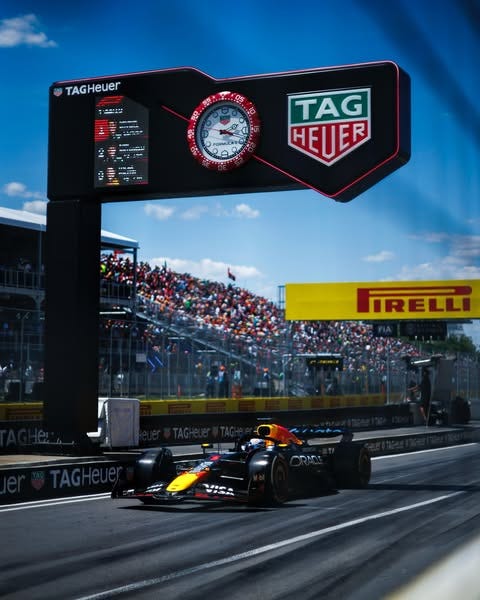Red Bull's Long-Overdue Reckoning: Why Christian Horner's Sacking Came a Year Too Late
A Cultural Perspective on Formula 1's Most Controversial Dismissal.
The news hit like a bull in a china shop: Christian Horner has been sacked after 20 years as Red Bull team principal. But for many of us who watched this saga unfold, the only surprise is that it took this long. In a sport where image is as important as speed, Red Bull's decision to finally part ways with Horner appears to be a calculated move that prioritises performance over principles. And that's precisely the problem.
A Year Too Late: Performance Trumps Morality
Let's be brutally honest about the timing. In February 2024, news emerged that Red Bull was investigating Horner after allegations of inappropriate behaviour from a female colleague. The complaint was eventually dismissed, but the damage to Red Bull's reputation, and more importantly, the message it sent about how the organisation values women, was already done.
However, during this period, Max Verstappen states his relationship with Horner remains “very good” despite the continuing investigation into his boss’s behaviour.
Why did it take Red Bull's on-track struggles to finally see Horner as a problem? The RB21 simply lacks speed, with an estimated 0.3-second disadvantage to McLaren in qualifying and even more during the British Grand Prix. Verstappen was visibly struggling to control the car through the opening stages, as he was powerless to hold off Piastri, before spinning on the exit of Stowe, a rare mistake that spoke volumes about how difficult the car had become to drive.
So letting Horner go after such a difficult first half of the season sends a clear and troubling message: performance takes precedence over moral obligations. When Red Bull was winning championships, they were willing to weather the storm of controversy. But the moment their car becomes uncompetitive, suddenly leadership becomes expendable. It's a calculation that speaks to the sport's deeper issues with accountability and values.
For women in motorsport, whether in the paddock, in the boardroom, or in the grandstands, this timing is particularly galling. It suggests that our concerns, our safety, and our voices are secondary to lap times and podium finishes. That's not just a bad look for Red Bull; it's a damaging precedent for the entire sport.
The Verstappen Question: Stay or Go?
Now comes the million-dollar question that will define Red Bull's future. What does Max Verstappen do next? The indications are that the four-time Formula 1 World Champion will remain with Red Bull in 2026, but the landscape has undergone a fundamental shift.
On one hand, Verstappen might see this as an opportunity to spearhead a new era. Red Bull will desperately need his expertise to climb back to the top, and there's something appealing about the narrative of a champion rebuilding a fallen giant. But equally compelling is the possibility that Max sees this chaos as his moment to try something new. The Mercedes seat alongside Kimi Antonelli suddenly looks like a much safer harbour. Toto Wolff has spent years courting Verstappen, and the stability of the Silver Arrows' organisation, coupled with their resurgence in recent seasons, might be precisely what the Dutchman needs.
There's also the question of legacy. Does Verstappen want to be remembered as the driver who stayed loyal to a troubled team or as the one who had the courage to seek new challenges? In a sport where careers are measured in decades, not years, this decision will echo through history.
Reinvention or More of the Same?
Perhaps the most intriguing aspect of this shakeup is Red Bull's opportunity to reinvent itself completely. Laurent Mekies, who was in charge of Racing Bulls, will replace Horner with immediate effect. This represents a chance to shed the "bad boy of the grid" persona that has defined Red Bull for so long.
Under Mekies' leadership, Red Bull could transform from a team that plays fast and loose with controversy into an organisation grounded in principles and respect. The fashion world has taught us that rebranding isn't just about changing logos, it's about fundamentally shifting culture. Faced with declining sales and criticism of its marketing, Victoria's Secret embarked on a significant rebranding effort to promote greater inclusivity and diversity, aligning with changing consumer expectations. Red Bull has the chance to prove that a team can be both successful and morally grounded.
The question is whether they'll seize this opportunity or default to their old ways. Will they continue to prioritise wins at any cost, or will they recognise that long-term success requires building a culture that attracts and retains the best talent, regardless of gender?
The Bigger Picture
This moment represents more than just a personnel change; it's a reflection of Formula 1's ongoing struggle with its own identity. The sport is more global, more diverse, and more scrutinised than ever before. Teams can no longer operate in the shadows, making decisions based solely on performance while ignoring their broader responsibilities.
For Red Bull, Horner's departure offers a reset. But only if they're willing to truly embrace change. The fashion industry has shown us that authenticity resonates with audiences far more than manufactured controversy. Red Bull has the opportunity to lead by example, to show that a team can be both competitive and principled.
The real test will be whether this change represents genuine evolution or merely a damage control measure. As someone who covers both fashion and motorsport, I can tell you that audiences are increasingly sophisticated. They can spot authentic change from a mile away. And they can smell performative gestures even faster.
Red Bull's next chapter starts now. The question is whether they'll write it with the same reckless abandon that got them into this mess, or whether they'll have the courage to build something better. For the sake of everyone who loves this sport, and especially for the women who deserve better, let's hope they choose wisely.










Thanks for this thought - provoking piece. I’ve had a visceral (irrational ?) distaste for Redbull since Abu Dhabi 2021 which was only exacerbated by Christian Horner’s race weekend head-butting with Toto Wolff and later the accusations of inappropriate behavior. Let’s hope that Laurent Mekies improves not only the team’s performance but also their reputation !!!!